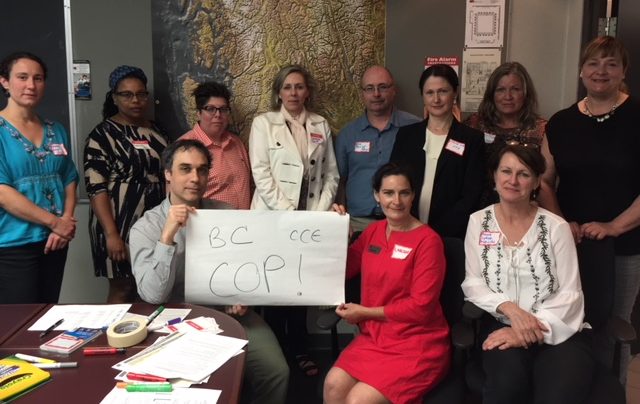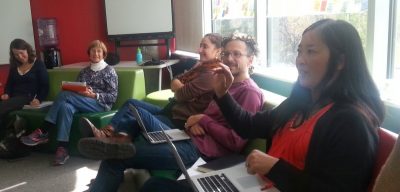by Chelsea Nash, CFICE Communications Research Assistant
 Entering into a partnership with post-secondary institutions (PSIs) can open a lot of doors for community-based organizations (CBOs), including access to certain funding opportunities, increased capacity, and the creation of new and collaborative networks with shared goals.
Entering into a partnership with post-secondary institutions (PSIs) can open a lot of doors for community-based organizations (CBOs), including access to certain funding opportunities, increased capacity, and the creation of new and collaborative networks with shared goals.
CCE partnerships can be mutually beneficial for both academic and community partners, as both entities have the opportunity to learn from each other, share resources, and deepen their respective understandings of the issues. This is particularly true when academic partners approach the partnership from a community-first perspective.
As one academic partner from the Community Food Security hub noted, “Academics can play an important role” in social and community movements. Speaking specifically about the food sovereignty movement, the academic said that “the movement is dependent on partnerships and finding ways to make these stronger and work better.”
CCE partnerships certainly come with their fair share of challenges, but many community partners find them to also be very valuable. For CBOs who haven’t partnered with an academic institution before, here are some of the benefits that come along with partnering with a PSI.
The benefit of a different perspective
Professional researchers like academics, who might bring different knowledge, experiences, and perspectives to the table, can be an asset to a community project. One community partner within CFICE’s Community Food Security Hub said that “having consistent, high level support to look at a challenge/opportunity in the community” in the form of an academic partner was a helpful resource.
 For some community partners within this hub, the partnership provided them with an opportunity to better understand how to approach, engage, and partner with academics in general: “Working with the academics helped us think about how to frame questions,” one community partner said. Participation also forced reflection on how to “work in ways that are movement-building and legitimate in the eyes of our academic colleagues.”
For some community partners within this hub, the partnership provided them with an opportunity to better understand how to approach, engage, and partner with academics in general: “Working with the academics helped us think about how to frame questions,” one community partner said. Participation also forced reflection on how to “work in ways that are movement-building and legitimate in the eyes of our academic colleagues.”
Community partners noted that the nature of their work is generally very busy, and “the academics involved bring a methodical and rigorous approach to the work, frequently reminding me through their observations and suggestions of the original goals of…[and] lessons learned from the project.”
Participants in CFICE’s Poverty Reduction Hub said the community-campus partnership provided an opportunity to engage in applied research, to “think about the bigger picture, and…ask stimulating questions.” One participant noted that the partnership enabled “opportunities for applied research within the community, and increased research capacity from community perspective,” describing it as a “win/win.” The applied research practice also provided opportunity for “initial evaluation” of “novel social enterprise[s],” enabling projects to move forward more effectively.
Formal evaluation practices
Partners within the Food Security Hub found that the Hub’s evaluation mandate encouraged the regular documentation of processes and experiences. Through the more formal research practices adopted within this Hub, partners were able to “capture information that was used to refine their evolving practice.” This process helped projects move beyond the anecdotal evidence they had previously relied on, a practice that was noted as a barrier in translating ideas into action.

Heather Reid chats with other CFICE members about the interpretation of CFICE’s year 4 evaluation data.
CFICE’s evaluation support was also a valuable resource for community partners who wanted to implement formal evaluation processes, but who did not have the capacity to do so. This lack of capacity can also be a barrier when community organizations are seeking funding, because, as one participant in the Poverty Reduction Hub noted, “funders demand evaluations: they like outcome based assessments.”
Credibility and legitimacy
Credibility and legitimacy within CCE partnerships is almost always a two-way street in that community and academic partners bring legitimacy to each other’s work. Academics often gain credibility within their own research through working with community partners as the community partners facilitate access for researchers to collect meaningful data, for instance.
Conversely, academic knowledge comes from a place of privilege, and academics can effectively use that privilege to empower community partners.
Participants in CFICE’s Poverty Reduction Hub noted that a SHHRC-funded grant lent some “legitimacy” to the project and “provides context and weight to the work.”
Within the Community Food Security Hub, participants similarly pointed to the credibility that academic partnerships sometimes lend to community work by “help[ing] the community concretely in making a political case for their work of funding.”
Similarly, in the Violence Against Women Hub, one community partner described how the presence of a supportive academic on the project gave them credibility with a partner whose resistance to the community organization was threatening the overall initiative. The community partner said, “This relationship has allowed us to be able to consolidate such that…academia cannot be used against the frontline, and that is what usually happens…so that was a perfect example of a moment where academic bolstered the front line. That’s a good partnership as far as I’m concerned.”
Leveraging Resources
Academic institutions have access to many resources that can be leveraged in the best interest of the community organization. Funding is perhaps the most obvious resource that academic partners can assist in accessing through, for instance, formal evaluation practices.
But resources that can be leveraged for community partners extends beyond the money. Another resource, for instance, is access to research assistants, student volunteers, etc., who can provide “the extra manpower and person power to get things done,” as one academic partner put it.
The networks that persist as a result of community-campus partnerships provide a resource that can be mined even after the partnership concludes. Such networks expose all parties to new ideas, new strategies, and future opportunities for collaboration.

The attendees of CFICE’s Vancouver CCE Regional Roundtable decided to start a community of practice to extend their networks.
Within the Violence Against Women hub, a community partner said the partnership “rejuvenated our ability to work together” as academics and activists, as it provided tangible means by which to collaborate and focus on shared goals.
A participant from the Poverty Reduction Hub similarly acknowledged the CFICE partnership as having “helped build [a] network across Canada regarding community university collaboration,” giving all partners access to valuable connections in their field.
The networks, shared goals, and potential for future collaboration are the most consistent benefits of CCE partnerships acknowledged across all CFICE hubs. As one community partner from the Violence Against Women Hub put it, “We have a movement that needs to be rejuvenated and academics need to be a part of it.”
This article draws from interviews and focus groups conducted in 2015-2016 as part of CFICE’s year 4 project evaluation, and includes common themes from across CFICE’s five Phase I hubs.
